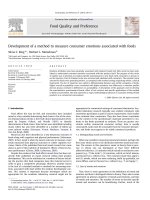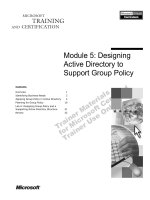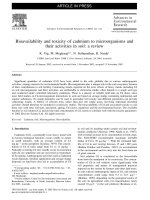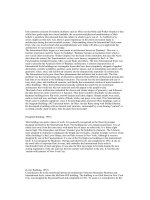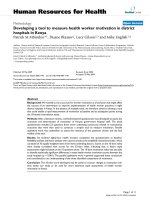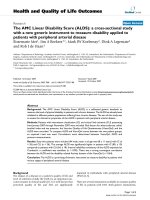Designing sensor node to measure soil moisture used in IoT network
Bạn đang xem bản rút gọn của tài liệu. Xem và tải ngay bản đầy đủ của tài liệu tại đây (953.3 KB, 8 trang )
JST: Smart Systems and Devices
Volume 32, Issue 3, September 2022, 026-033
Designing Sensor Node to Measure Soil Moisture Used in IoT Network
Hieu T. Nguyen*, Hung N. Kieu, Hieu B. Nguyen
Posts and Telecommunications Institute of Technology, Hanoi, Vietnam
*
Corresponding author email:
Abstract
Together with the Industry 4.0 revolution, the IoT networks have been continuously growing, accompanied by
the invention and improvement of communication protocols and sensor terminals. New sensor nodes in the
IoT systems need to adapt to the protocol and optimize the built-in data collection and measurement
capabilities. In this paper, we present a new development direction for the IoT network sensor node, namely
the use of a capacitive sensor principle to research and develop the sensor node to measure soil moisture.
Simulation has been carried out to evaluate the advantages and disadvantages of the method and to propose
the applicability of sensor nodes in IoT systems.
Keywords: Coplanar plate, IoT, soil moisture, MySensors, STM32F030F4P6.
1. Introduction 1
greatly influenced by environmental noises. These
controllable sensor types usually use a microprocessor
to serve the control operations [11,12]. This makes the
research process much more convenient than that of
fixed frequency oscillators.
In recent years, along with the rapid development
of sensor devices, soil moisture has become an
important parameter, which should be controlled in
many fields such as agriculture [1,2], geology,
ecology, biology, and hydrology [3-5]. Manufacturers
have been constantly developing and improving sensor
devices to control this factor.
In general, the soil moisture sensors have
achieved certain results, but it is still a separate
development of each module. To use these sensors,
users have to spend a lot of money to be able to
ensemble all the modules into a single system.
However, most of the products currently
available in the market focus on controlling this factor
only on specialized equipment [6,7]. With the
increasing demand for soil moisture measuring,
producing powerful, low-cost equipment with reliable
measuring abilities remains a challenge.
Inheriting previous advancements of sensors
using capacitive sensing technology, we decided to
choose a sensor design with a controllable scan
frequency. With this direction, the product will aim for
high integration, short survey time, low cost, and high
performance.
Capacitive sensing technology has been applied
to address this challenge [8]. From the basic physical
phenomenon of a capacitor with two coplanar poles,
many studies have investigated to achieve an optimal
design. The factors forming the two plates such as the
width of the plate, the thickness of the probe [9], the
frequency of scanning the plate [10], the material of
the plate [6] are all utilized thoroughly.
The content of this paper is divided into five
parts. Part 2 presents the theoretical basis of the
capacitive sensor principle and measurement method,
some products of the same type. Part 3 presents the
direction of design, manufacturing, and optimization.
In Part 4, the experimental results are presented and
discussed. Finally, Part 5 concludes the paper and
suggests the development direction.
The general design for this type of sensor has two
directions, namely, the scanning design using a fixed
oscillator circuit [10] and a controlled scanning
circuit [11].
2. Theoretical Background
2.1. Capacitive Sensing Technology
The sensor types using fixed frequency
oscillators require a lot of research and development
efforts for surveying as well as high-cost materials.
However, thanks to the elaborate investigation, these
sensor types always have high accuracy and stability
with environmental factors. In contrast, the sensor
lines used with a controllable sweep frequency are
Capacitive sensing technology is based on
exploiting the voltage difference between the two
plates of a capacitor (Fig. 1) [4]. In practice, the
performance on capacitors of the two most common
types is parallel capacitors and coplanar capacitors.
ISSN: 2734-9373
/>Received: September 16, 2020; accepted: May 16, 2022
26
JST: Smart Systems and Devices
Volume 32, Issue 3, September 2022, 026-033
Fig. 1. Electromagnetic field of the capacitor: a) parallel plate capacitor b) coplanar plate capacitor
Based on the change in the environment between
the two plates of the capacitor, many products have
been invented such as touch screens, fingerprint
sensors. Therefore, the use of this principle to develop
sensor is possible to measure soil moisture.
In fact, when starting to read an ADC channel
(Fig. 3), the obtained value is the voltage caused by the
environment around the measuring channel. Compared
to the GND of the processor, there is one more default
parasitic capacitor.
2.2. Measurement Method
Whether the voltage is read continuously or
discretely, analog signal will be greatly affected by this
parasitic capacitor. Furthermore, the specification of
this component is not provided by the manufacturer.
Therefore, if we simply read the analog values, the
results will be skewed due to two following factors:
noise from the environment and noise caused by
parasitic capacitors. However, this is the premise for
developing voltage measurement techniques in the
next section.
Most of the current microcontrollers on the
market have built-in analog-to-digital converters
(ADCs) that can be used to measure voltage. Taking
advantage of this, a change in the environment around
the ADC readout will cause the ADC reading to
change accordingly as is shown in Fig. 2.
In Fig. 2, 𝐶𝐶𝑥𝑥 is the measuring environment
corresponding to the voltage 𝑈𝑈𝑥𝑥 and 𝐶𝐶0 is the parasitic
capacitor in the MCU corresponding to the voltage 𝑈𝑈0 .
2.3. Some Available Soil Moisture Sensor Products
on the Market
If specialized equipment is not taken into
account, soil moisture sensors have two main types,
with control and without control of the sweep
frequency.
2.3.1. Sensor type with sweep frequency control
This type typically uses an LC oscillator or an IC
oscillator (e.g. NE555) to determine the time period of
signal acquisition (Fig. 4). The result is returned in the
form of an analog signal.
Advantages: integrated probe and control circuit
in the same device with the compact size of
99mmx16mm.
Fig. 2. Principle of voltage measurement of
microprocessor
Fig. 3. Analog-to-digital converter (ADC)
Fig. 4. Sensor with sweep frequency control
27
JST: Smart Systems and Devices
Volume 32, Issue 3, September 2022, 026-033
Disadvantages: the control circuit has a fixed
function that leads to a low adjustment and
compatibility, and is difficult to install customizations
according to different intents. Additionally, it needs to
be connected to the radio and control unit to become
an IoT node.
2.3.2. Sensor type without control the sweep frequency
The sensor measures according to the principle of
exploiting the voltage difference between the two
sensor branches (Fig. 5). The results obtained will be
passed through an amplifier circuit to enhance the
signal. Then, the result is returned as an analog signal.
Advantages:
Energy-saving,
adjustable by using resistor.
sensitivity
Disadvantages: the device consists of many
separate blocks, since the circuit uses a rheostat, the
device's accuracy is affected by the weather and the
environment. Moreover, the device needs to be
connected to the radio and control unit to become an
IoT node.
Fig. 5. Sensor without sweep frequency control
In general, the products on the market have
achieved promising results, but are mainly still stuck
in the form of discrete modules. These sensors will
only work well in certain environments due to low
customizability. If integrated into a large system, it
will be expensive as well as difficult to install.
Therefore, it is essential to design and manufacture a
versatile, highly customizable humidity sensor. This
sensor should not only evaluate on single tests but also
integrates ready-to-build features into an IoT node
prototype and immediate use in the data collection
system. The application will be meaningful both in
terms of technique and practical application.
Fig. 6. Controllable scanning system principle
or 𝑃𝑃𝑆𝑆𝑆𝑆𝑆𝑆𝑆𝑆𝑆𝑆𝑆𝑆 = 𝐸𝐸(𝑋𝑋)
3. Design and Manufacture of Product Prototypes
The variance of N samples is calculated:
In this section, we will demonstrate voltage
measurement techniques, perform product design, and
optimize prototype designs.
From the above theoretical basis, it can be seen
that only discretely measuring ADC values on a signal
measurement pin will not be able to promote
capacitive sensing technology. Capacitor Cx must be
discharged after each measurement and charged before
a new value is measured.
𝑁𝑁
(3)
𝑆𝑆𝑆𝑆𝑆𝑆 =
𝑃𝑃𝑆𝑆𝑆𝑆𝑆𝑆𝑆𝑆𝑆𝑆𝑆𝑆
𝑃𝑃𝑁𝑁𝑁𝑁𝑁𝑁𝑁𝑁𝑁𝑁
(4)
The above statistical equations show the
following:
•
•
We calculate the average signal of N samples as:
𝐸𝐸(𝑋𝑋) = �𝑘𝑘=1 X(k)
𝑃𝑃𝑁𝑁𝑁𝑁𝑁𝑁𝑁𝑁𝑁𝑁 = �𝑉𝑉𝑉𝑉𝑉𝑉(𝑋𝑋)
Then the signal-to-noise ratio (SNR) is
The continuous measurement model is shown in
Fig. 6. With this measurement technique, the obtained
ADC value will reflect the change in the environment
continuously. Then the obtained results will be put into
a statistical model to describe the variation of the
environment around the signal measuring pin.
𝑁𝑁
(2)
Noise is determined as:
3.1. Voltage Measurement
1
𝑉𝑉𝑉𝑉𝑉𝑉(𝑋𝑋) = 𝐸𝐸[(𝑋𝑋 − 𝐸𝐸[𝑋𝑋])2 ]
•
(1)
28
The smaller the 𝑃𝑃𝑁𝑁𝑁𝑁𝑁𝑁𝑁𝑁𝑁𝑁 magnitude, the more
accurate the measurement
The larger the SNR, the more precise the
measurement
The smaller the measurement time, the more
effective the control of the measurement
environment
JST: Smart Systems and Devices
Volume 32, Issue 3, September 2022, 026-033
3.2. Sensor Design
For the purpose of designing to integrate sensors
and IoT nodes into a single product, we have chosen
STM32F030F4P6 as the control MCU.
From the reviews of the previous section, the
measurement of the signal cannot be completely
dependent on CPU. This is mainly because using the
CPU for measurement operations will generate a lot of
delays, causing a lot of measurement errors since the
CPU has to calculate and control at the same time.
To overcome the disadvantage of timing, the
measurement will be run entirely according to an MCU
timer. According to the diagram in Fig. 7, the DMA
and Timer will automatically take control steps to
measure the values. Peripheral connection diagram is
implemented as shown in Fig. 8. By this control model,
the CPU only needs to take the obtained value,
calculate and return the statistical values. However, in
order to measure the correct values according to the
theory and control model, the timer must operate
relatively accurately in terms of time. The capacitor
must be discharged, and the ADC must be activated
correctly because improper control operations will
lead to wrong results.
Therefore, we
timeline as follows.
construct the
Fig. 7. Control model
measurement
Fig. 9 is the ideal timeline for a measurement
cycle. During a measurement cycle, the timer counts
down to 0. In the timeline 4 events occur:
1.
CC4: Timer activates ADC.
2.
CC3: Timer activates DMA to control capacitor
charging.
3.
CC2: Timer activates DMA to get ADC value
obtained after ADC finishes operation.
4.
Update: Timer enabled DMA controller IO
discharge capacitor.
Fig. 8. Block diagram of peripheral operations
We conduct a survey of 4 timestones and
conclude: CC3 is the most important milestone. CC3
must be after CC4 and before CC2. The best time will
be the time for the highest signal-to-noise ratio.
Conduct a CC3 survey running from CC4 to the end of
the timeline for the following results. From the survey
results, CC3 is selected so that the highest SNR is
achieved.
Since it is not possible to simultaneously activate
the ADC measurement and charge the capacitor, and
to charge the capacitor also requires a transient time,
we decided to measure the two channels alternately.
Thus, the measurement results of the secondary
channel will be discarded and only the results of the
main channel will be taken. In the above timeline, the
selected secondary channel is channel 14. According
to the documentation from the manufacturer [16], the
STM32F0x has all 19 ADC measurement channels, 16
external channels and 2 internal channels. With a
limited number of IOs, the STM32F030F4P6 only
supports 10 external measurement channels [16], so
the remaining measurement channels are connected to
GND by default. Taking advantage of hardware
availability, reading the ADC from channel 14 has
absolutely no effect on channel 0 or the control model.
These
four
timelines
are
completely
interchangeable
to
accommodate
different
measurement environments and purposes. But the
timestones are each very closely related to each other.
If one timestone changes, the remaining parameters
will have to change accordingly. In this survey, we
performed
experiments
in
an
atmospheric
environment.
29
JST: Smart Systems and Devices
Volume 32, Issue 3, September 2022, 026-033
Fig. 9. Timeline of measurements
Fig. 11. Parameters of the pole plate
To increase accuracy and reduce survey time, we
use a free, off-the-shelf platform to assist with probe
design. Just enter specific parameters, this website [14]
will give optimal results. Referring to the theoretical
calculation parameters and experimental surveys of
previous studies [8], the time used for hardware design
has been significantly reduced.
Moreover, in designing a good probe that
integrates the transceiver module is a difficulty in the
research process. There are many good transmission
modules today such as Lora, Zigbee, Bluetooth,
infrared, RF. However, we have chosen the nRF24L01
transceiver module to integrate into the product [17].
With the advantage of cost, capacity as well as the
ability to communicate with MCU simple, and being
easy to use, nRF24L01 is the most suitable module.
The circuit will act both as a sensor and a node in the
IoT network.
Fig. 10. Signal capability survey
3.3. Prototype Design
Applying the principle of operation of a coplanar
capacitor, to design the transducer, it is necessary to
pay attention to the parameters of the two plates
(Fig. 11) [13].
The capacitance of the two plates will be changed
depending on the environment around them:
𝐶𝐶 = 𝜀𝜀𝑟𝑟 𝜀𝜀0
𝑆𝑆
𝐷𝐷
Therefore, we focus on integrating the
transceiver module while ensuring good transducer
operability. The first prototype is designed as in
Fig. 12, Fig. 13, Fig. 14.
(5)
where the dielectric constant in a vacuum is
𝜀𝜀0 = 8,854 × 10−12 𝐹𝐹𝑚𝑚−1
30
JST: Smart Systems and Devices
Volume 32, Issue 3, September 2022, 026-033
The model includes 1) IoT nodes designed by the
team (Fig. 15); 2) IoT gateway; 3) Internet
communication gateway; 4) Internet Cloud; 5)
Computer. The functions of these components are:
Fig. 12. The top of our product
Fig. 13. The bottom of our product
Fig. 14. Actual image of our product
Some characteristics of the designed sensor node
are follows:
•
Compact design with a size of 116 cm x16 cm.
•
Integrated radio module nRF2401 to be able to
transmit and receive data in an IoT network.
•
Low power consumption.
•
Suitable for large area smart irrigation systems.
-
IoT Node: collecting information about soil
moisture, then transferring it to the IoT gateway.
-
IoT Gate: collecting and encapsulating
information from IoT nodes to transfer to the
internet communication gateway.
-
Internet communication gateway: connecting IoT
gateway via wireless or wired method, it is a
bridge to bring information collected from IoT
gateway to cloud and transfer control information
from operating system to IoT gateway (if
available).
-
Internet cloud: storing information and data (here
we use Things Board)
-
Computer: used to collect, analyze, evaluate
information, or give control commands.
4.2. Experimental Results
We evaluate the system with a random soil
sample as shown in Fig. 16.
The average statistics of the results obtained in 1
hour are presented in Fig. 17.
All components have been integrated with the same
circuit, so the device will be convenient and easy to use
for people who are not knowledgeable about
electronics.
We can have following comments:
- When the sensor is plugged into the ground, the
sudden change in the environment results in a sudden
change in sensor signal.
- During the first 10 minutes, the measured value
from the sensor increases gradually due to the change
in humidity.
4. Results and Discussion
This section presents an overview of the achieved
results, discusses the comparison with other products
on the market.
- Since the sensor is designed to be very sensitive
when the hand is close, it will cause interference.
4.1. Experimental Model
- The capillary of the soil will determine whether
the moisture change quickly or slowly.
The system model for evaluation of the humidity
sensor and the IoT node operation is shown in Fig. 15
Fig. 15. Experimental IoT system model
31
Fig. 16. Experimental survey
setup
JST: Smart Systems and Devices
Volume 32, Issue 3, September 2022, 026-033
Fig. 17. Results of 1 hour survey
Fig. 18. Survey of soil mixed with sand
Fig. 19. Survey of soils that are not mixed with sand
Investigate the sensor's operation with different
soil types such as soil mixed with sand (Fig. 18), and
soil not mixed with sand (Fig. 19).
Comment: With sand-mixed soil, moisture
decreases faster than in normal soil since the capillary
will determine how the moisture change. This fact has
proven that the sensor node is showing the correct
moisture content in the soil.
4.3. Evaluate Advantages and Disadvantages
Advantages:
2.
Reduce production costs: due to integration of the
communication module with the sensor, the IoT
network, if used, will reduce the cost of buying
separate sensor modules;
4.
Low power consumption: the product does not
require additional power for discrete modules
and the CPU usage is optimized;
5.
Using the MCU to preprocess input data to
improve the quality of data sent to the monitoring
and control center.
Disadvantages:
Compared with other moisture meter products on
the market, our products have some outstanding
features such as:
1.
3.
The ability to integrate transmission and
reception communication: the node has a built-in
radio communication module nRF24L01 that
allows compatibility with many network
protocols.
1.
The sensor is extremely sensitive to the
environment, so it is easily affected by unwanted
factors directly affecting the sensor node.
2.
The survey for each soil environment still has to
be done manually.
5. Conclusion
Based on a developed technology, we have
redesigned and improved a soil moisture sensor to
integrate into the IoT node, thereby enriching the
current sensor network components. With low cost,
high performance, the product has given a promising
direction for sensor design as well as IoT node design.
This paper has focused on researching and finding a
The ability to customize with the environment:
due to the concrete flowchart, it is easy to obtain
time samples corresponding to different soil
samples. Sensors with the same principle are not
currently able to do this;
32
JST: Smart Systems and Devices
Volume 32, Issue 3, September 2022, 026-033
measurement method that is more effective than
available products on the market, and the highlight is
the ability to measure with control to help take
initiative in methods and solutions to apply in practice.
The product can completely replace similar products
on the market.
In an IoT system in smart agriculture that needs
to use a relatively large number of sensor nodes, it is
important to consider the cost reduction and mastering
the core technology when applying it to life. With a
compact design, highly customizable, easily
compatible with technical parameters according to the
purposes of use, the ability to develop and apply
sensors into practice is possible.
The research team would like to thank the Posts
and Telecommunications Institute of Technology for
supporting us to carry out this research.
[13] Hong, J., Yoon, D. S., Kim, S. K., Kim, T. S., Kim, S.,
Pak, E. Y., No, K., AC frequency characteristics of
coplanar impedance sensors as design parameters. Lab
on a Chip, 2005, 5(3), 270-279.
/>
References
L. D. Baver, Soil Physics, John Wiley and Sons, New
York, 1956,
/>
[3]
G. S. Campbell, A simple method for determining
unsaturated conductivity from moisture retention data,
Soil Sci. 117 (6) (1974)311–314,
/>
[4]
D. Hillel, Fundamentals of Soil Physics, Academic
Press, Orlando, Florida, 1980,
/>
[5]
H. Y. Fang, J.L. Daniels, Introductory Geotechnical
Engineering – An Environmental Perspective, Taylor
and Francis, New York, 2006.
[6]
ASTM D 2216, Standard Test Methods for Laboratory
Determination of Moisture (Moisture) Content of Soil,
ASTM International, West Conshohocken, PA, 2008.
[7]
S. Fityus, T. Wells, W. Huang, Moisture content
measurement in expansive soils using the neutron
probe, Geotech. Test. J. 34 (3) (2011) 1–10,
/>
Shirahama, Y., Shigeta, R., Kawahara, Y., Asami, T.,
Kojima, Y., Nishioka, K.,Implementation of wide
range soil moisture profile probe by coplanar plate
capacitor on film substrate, IEEE Sensors Journal,
Nov. 2015, pp. 1-4,
/>
[12] Kolodziejski, J., Low energy wireless solution for soil
moisture monitoring, (Doctoral dissertation, Rutgers
University-School of Graduate Studies), 2018.
Acknowledgement
[2]
[9]
[11] Chetpattananondh, K., Tapoanoi, T., Phukpattaranont,
P., Jindapetch, N., A self-calibration water level
measurement using an interdigital capacitive sensor.
Sensors and Actuators A: Physical, 2014, 209,
175-182,
/>
To survey and evaluate products, we apply the
sensor network system [15]. Thanks to the versatility
of the nRF24L01, it may be suitable to operate under
the more common IoT network that is Mesh network.
W. B. Haines, The volume changes associated with
variation of water content in soils, J. Agric. Sci. 13
(1923) 296–310,
/>
Goswami, M. P., Montazer, B., Sarma, U., Design and
characterization of a fringing field capacitive soil
moisture
sensor,
IEEE
Transactions
on
Instrumentation and Measurement, (2018), 68 (3),
913-922,
/>
[10] Angkawisittpan, N., Manasri, T., Determination of
sugar content in sugar solutions using interdigital
capacitor sensor, Measurement Science Review, 2012,
12(1), 8-13,
/>
Based on the controlled measurement technique,
the product can be improved to become other types of
sensors that can be widely used in both production and
life such as water, fog, obstacle or movement sensor.
[1]
[8]
[14] Analysis of Multiconductor Transmission Lines, 2nd
Edition, Clayton R. Paul, Wiley-IEEE Press, ISBN:
9780470131541, 2008, pp. 145-156.
[15] A. Di Nisio, T. Di Noia, C. Guarnieri Calò Carducci,
M. Spadavecchia, Design of a low cost multipurpose
wireless sensor network, in Proc. IEEE International
Workshop on Measurement and Networking,
Coimbra, Portugal, 2015, E ISBN: 978-1-47991860-7,
/>[16] STMicroelectronics, RM0360 Reference manual:
STM32F030x4/x6/x8/xC and STM32F070x6/xB
advanced ARM®-based 32-bit MCUs, Apr. 2017,
Available at:
/>dm00091010-stm32f030x4-x6-x8-xc-andstm32f070x6-xb-advanced-arm-based-32-bit-mcusstmicroelectronics.pdf
[17] Nguyen Trung Hieu, Tran Duc Nam, Dinh Sy Quang,
Dang The Ngoc, Performance enhance nRF2401based IoT by using Reed-Solomon code, Journal of
Science and Technology on Information and
Communications, Vietnam, ISSN 2525-2224, No.
03&04 (CS.01) 2019, pp 87-92.
33
